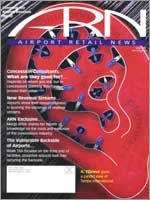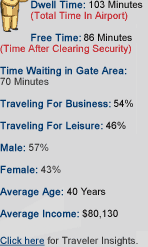


 ARN"It’s Back to Basics, Well Almost"By Ira Weinstein
Using an ad from the archives may or may not be the best thing to do but at least ad executives are listening to their customers. They are not alone. Packaged goods, healthcare, and other industries are returning to basics in meeting customer needs. They are not taking risks! In these times, given the dramatic changes in the behavior and mindset of the travelers, the concessions industry should not take risks. Abrupt change is exactly the wrong decision to make. Travelers have taken a 180 degree attitude shift and, as the studies of our company show, are beginning to adapt well to the new airport environment. At the same time they are calling for pre-September 11th treatment, which even then was not up to their standards. Does our industry get it? Do airport and concessions managers really understand or are we guessing? Perhaps we tend to seek solutions by being reactive. Proactivity seems not to fit into our overall master plans. We tend not to listen to travelers’ needs and let ratings and being the "best airport" or having the "#1 concessions program" be the measurement standard. We continue to return to old ways that may no longer work. We copy each other in what we do, discontinuing end-user input to a great extent. Know Your CustomerInstead of "pulling" customers into our stores we push them away. We think of raising prices, cutting staff, limiting hours of operation, but have we forgotten the basic pre-September 11th principles of retailing …know your customer. Those airports that are almost back to pre-September 11th passenger levels and those that are not should strongly consider the comments and opinions of more than 8000 post-September 11th and more than 15,000 pre-September 11th travelers our company surveyed. The statistical analysis is of course available but let’s hear comments about what the declining customer service numbers represent: "Some staff have real attitude problems. You try to be pleasant to them but they snare at you in return. They are too busy chatting with each other." "Due to the long wait on the food lines to get served, the food court stores’ professionalism is horrible. All they do is work like turtles and talk to each other." "They (concession employees) dress like slobs. Don’t they have any self-respect? Do their managers care? The airline staff is neat, well dressed and polite. How about having them teach the others." "Politeness needs to be taught. Why don’t they realize we (travelers) are anxious? A smile works wonders." Now back to statistics because we all seem to like them better. Since more people are flying since September 11th, airports are now becoming more crowded but it appears that we have not re-adjusted to the increased traffic. Dirty terminal facilities and concession shops, a frequent complaint, indicates we are not acting quickly enough. While people remain very concerned about security they are quickly becoming much more judgmental about most other airport factors, than they were immediately following September 11th. Business travelers are much more critical than leisure travelers, and overall travelers’ experiences are now showing major declines from just four months ago. Some of the causes according to our surveys are that travelers experience the following:
These complaints are not coming from inexperienced travelers. In fact business travelers report having taken 6.25 airline trips since September 11th and 14 or more trips in the past year. Which shows no real difference from the same period a year ago.
Last December, an improvement in satisfaction was seen, but this is no longer so. Recent surveys show:
In comparison to "cleanliness of area" retail services receive slightly higher ratings with "pricing" registering the lowest level of satisfaction. What Should We Consider Doing?
Above all, adopt a proactive customer service program. Don’t be a follower of others in our industry just because they are doing it. Chances are, you could do it better.
|
|
||||||||||||||||||||||||||||||||||||||||||||||||||||||||||||||||||||||||||||||
| home | about us | services | methodologies | clients | press | contact us | |||||||||||||||||||||||||||||||||||||||||||||||||||||||||||||||||||||||||||||||
 A
major airline plans to reintroduce an ad campaign from the past
(New York Times 4/30/02). An advertising executive stated they are
taking advice from their customers who voted an ad as one of the
"best loved" and "most requested" commercials.
A
major airline plans to reintroduce an ad campaign from the past
(New York Times 4/30/02). An advertising executive stated they are
taking advice from their customers who voted an ad as one of the
"best loved" and "most requested" commercials.
